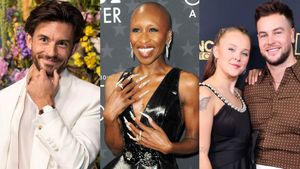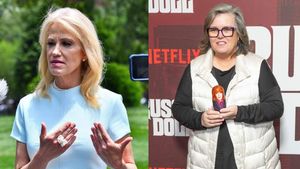All Rights reserved
By continuing to use our site, you agree to our Privacy Policy and Terms of Use.
Your support makes The Advocate's original LGBTQ+ reporting possible. Become a member today to help us continue this work.
"How's Micah?" my father-in-law texts my spouse. He lives in a small suburb in Georgia, sings at church every Sunday, and occasionally wears Hawaiian-print shirts. Every time a trans person makes a splash in mainstream media -- Chaz Bono on Dancing With the Stars, Laverne Cox gracing the cover of Time -- he checks in, his small way of letting us know he's totally cool with everything. He is also one of 17 million Americans who saw Caitlyn Jenner come out as transgender on national television.
I haven't even come out to 17 people, at least not with the whole story.
Folks in my life fall into three camps: those who still see me as the girl I never was, those who believe I'm a trans man, and those who think I'm nothing more than a sweet-mannered five-foot short guy. All three groups are equally convinced that what they see is so blatantly, obviously, the only possible truth. But even the most well-meaning ones -- the ones who do know I'm transgender or have to some degree intuited that some sort of gender transformation has taken place -- don't quite grasp the entire depth of my identity.
My gender is too complicated for a single sentence. Confessing "I'm nonbinary" elicits the usual quandary: "What's the binary?" Just like some people don't feel they are girls and others don't feel they are boys, I feel I'm neither. Yet that one sentence already assumes an understanding -- and acceptance of -- the canonical transgender experience. It's a big leap to understand nonbinary identities, considering that the latter conversation has barely begun.
Simply put, the gender binary is the idea that there are only two distinct sexes and/or genders: male and female. This is false. In fact, gender (as well as sex) is a spectrum. Yet talking about transitioning as "transcending gender" -- thus queering gender -- is not equivalent to portraying the genderqueer spectrum. Most trans people still identify within conventional notions of man or woman; after all, a trans man is a man, a trans woman is a woman. What about the trans not-men, trans not-women?
To the media, nonbinary people are nonexistent.
We're in a time when transgender stories are exploding in mainstream avenues, a time where finally more and more journalists are getting it right. Thanks to interviews like the one in which Laverne Cox and Carmen Carrerra quashed Katie Couric's interrogation about their genitals, or Janet Mock's flipping the "innocently curious yet invasive" script on Alicia Menendez, narratives are respectfully moving away from intrusive questions. And John Oliver's recent segment unequivocally set the record straight on what allies should ask versus what is none of their business.
But while the Last Week Tonight anchor accurately stated that being trans means not identifying with the gender you were assigned at birth, he omitted that some transgender people go on to identify as something other than male or female. Failure to acknowledge nonbinary identities -- even in the most inclusive trans coverage -- is unfortunately the norm.
Thanks to celebrities like Ruby Rose or Miley Cyrus proclaiming to be beyond gender (although, beyond these recycled sound bites, I don't really know how these celebrities truly identify), there's been a recent uptick in mainstream articles talking about identities that stray from the male/female binary. These conversations are critically advancing the dialogue of the relationship between gender and sex, helping our society redefine what gender really is.
But while I should be grateful for the coverage, what I mostly see is that it remains deeply flawed, perpetuating harmful stereotypes that prevent the public from understanding nonbinary genders, much less take them seriously.
A recent personal example illustrates this phenomenon well: A mainstream magazine asked me to comment on Ruby Rose's declaration for an article titled "3 People Define Their 'Gender Fluidity,'" yet none of the interviewees featured seem to identify as gender-fluid. Commonly, these articles mistake the difference between gender fluidity as a concept -- where society gains freedom from imposed gender roles and stereotypes -- versus gender-fluid as an identity, where a person has a internal sense of self that is nonstatic, oscillating between masculine and feminine among various combinations.
Continued conflation in the media over words and concepts relating to any gender identity that is not strictly male or female is only getting worse. Genderqueer and nonbinary are relatively equivalent umbrella terms. Other labels can be used to distinguish diverse genders within these; for instance, folks who feel neither male nor female or feel an absence of gender often say they are agender or neutrois; people whose identity encompasses both male and female may use labels like androgyne or bi-gender, along with many more combinations. The adoption of a specific term is personalized, and definitions may vary widely across individuals.
Moreover, terms like "gender-fluid" are being used as a catchall for people who sidestep gender lines. Since people with alternative gender presentations are lumped into a genderqueer category, articles are often quick to differentiate them from those who are "really" transgender. Whether someone identifies within the trans umbrella or not is up to the individual; however, it is false to assume that genderqueer and transgender are mutually exclusive.
Queer expressions of gender are further confused with sexuality. To be clear: Gender is who you are, sexuality is who you like. Having a gender-nonconforming expression does not necessarily mean you are gay or bisexual; similarly, a nonbinary person may be attracted to men, women, any, or neither. Ultimately, what this inconsistent jumble of terms does is make it harder for audiences to wrap their minds around the basic idea that gender identity -- an internal sense of self -- can exist outside of the male and female dichotomy.
Thankfully, we are moving past the trans trope of "stuck in the wrong body." Ironically, genderqueer coverage almost never focuses on the body; instead, we are dealt lengthy descriptions of small frames draped in baggy cargo pants, beards with skirts and high heels, a preference for football rather than ballet, ambiguously gendered names, odd-sounding pronouns, and the occasional mention of binding.
Gender runs much deeper than clothes, hair, makeup, colors; although these are means to express it, they do not make up one's gender. Yet the media continues to treat gender nonconformity as something superficial: men who wear dresses, androgynous women with short hair, or people who have evolved past gender norms to simply find it "irrelevant." Even the good articles gloss over nonbinary people who medically and legally transition, who undergo discrimination in health care, who exist on a spectrum of age, class, race, body type, and any other demographic, who are the butt of harassment from all fronts.
"Genderqueer" is still a niche word, politically charged with a multitude of meanings. Even trans communities dismiss us; the pervasive stereotype of confused adolescents flippantly toying with gender norms serves as the abstract representative of my identity, of me. But I'm not playing around: I live my gender, have done so for the past five years, and intend to do so for the next 50. Although someone's gender may not have an official word or color or box to tick, nevertheless it exists on a plane of reality equal to that of trans men and women.
The seriousness of nonbinary genders extends beyond myself. In conferences, online, at local gatherings, I've met the gamut: teenagers to 50-year olds, newbies and veterans, genderqueer or nonbinary, agender or bi-gender or gender-fluid. There are a million combinations of us, but no one yet to tell our story to our friends and families, to the average American at the breakfast table, in dorm rooms and bedrooms, in grocery aisles and waiting rooms, reading all about it in Vanity Fair.
Mainstream portrayals of transgender icons weave a fabric of shared knowledge, common ground our community can stand upon to begin unraveling our truth. But when our loved ones don't even understand the basics, the personal needs and nuances of nonbinary transgender people remain in the backburner.
Right now there is still no magazine our friends can buy, no book our doctors can borrow, no TV show our family can watch, no famous celebrity I can simply point to and say, "That's me, get it?"
MICAH is a Mexican writer living in San Francisco, who has been blogging about nonbinary gender at Neutrois.me since 2011. Micah's other writing can be found on Everyday Feminism.




































































Charlie Kirk DID say stoning gay people was the 'perfect law' — and these other heinous quotes